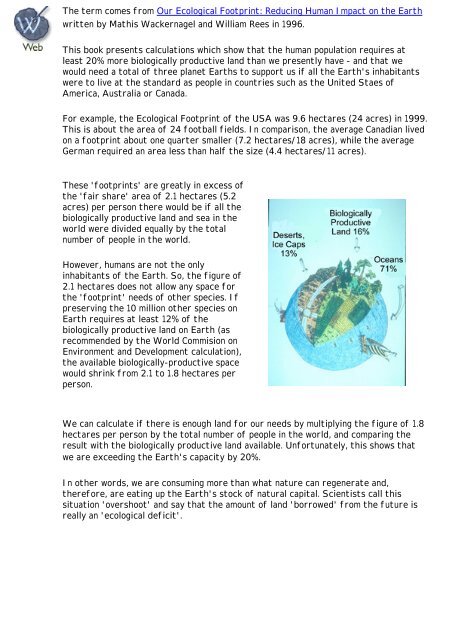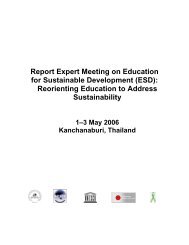Module 9 Consumer education - APCEIU
Module 9 Consumer education - APCEIU
Module 9 Consumer education - APCEIU
You also want an ePaper? Increase the reach of your titles
YUMPU automatically turns print PDFs into web optimized ePapers that Google loves.
The term comes from Our Ecological Footprint: Reducing Human Impact on the Earth<br />
written by Mathis Wackernagel and William Rees in 1996.<br />
This book presents calculations which show that the human population requires at<br />
least 20% more biologically productive land than we presently have - and that we<br />
would need a total of three planet Earths to support us if all the Earth's inhabitants<br />
were to live at the standard as people in countries such as the United Staes of<br />
America, Australia or Canada.<br />
For example, the Ecological Footprint of the USA was 9.6 hectares (24 acres) in 1999.<br />
This is about the area of 24 football fields. In comparison, the average Canadian lived<br />
on a footprint about one quarter smaller (7.2 hectares/18 acres), while the average<br />
German required an area less than half the size (4.4 hectares/11 acres).<br />
These 'footprints' are greatly in excess of<br />
the 'fair share' area of 2.1 hectares (5.2<br />
acres) per person there would be if all the<br />
biologically productive land and sea in the<br />
world were divided equally by the total<br />
number of people in the world.<br />
However, humans are not the only<br />
inhabitants of the Earth. So, the figure of<br />
2.1 hectares does not allow any space for<br />
the 'footprint' needs of other species. If<br />
preserving the 10 million other species on<br />
Earth requires at least 12% of the<br />
biologically productive land on Earth (as<br />
recommended by the World Commision on<br />
Environment and Development calculation),<br />
the available biologically-productive space<br />
would shrink from 2.1 to 1.8 hectares per<br />
person.<br />
We can calculate if there is enough land for our needs by multiplying the figure of 1.8<br />
hectares per person by the total number of people in the world, and comparing the<br />
result with the biologically productive land available. Unfortunately, this shows that<br />
we are exceeding the Earth's capacity by 20%.<br />
In other words, we are consuming more than what nature can regenerate and,<br />
therefore, are eating up the Earth's stock of natural capital. Scientists call this<br />
situation 'overshoot' and say that the amount of land 'borrowed' from the future is<br />
really an 'ecological deficit'.








